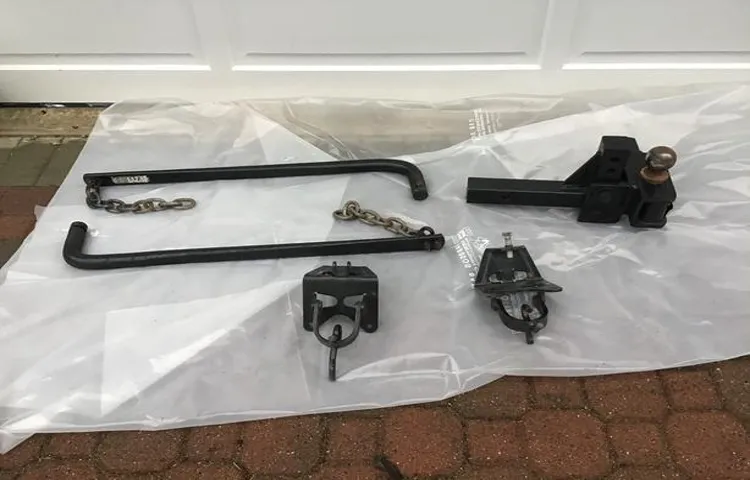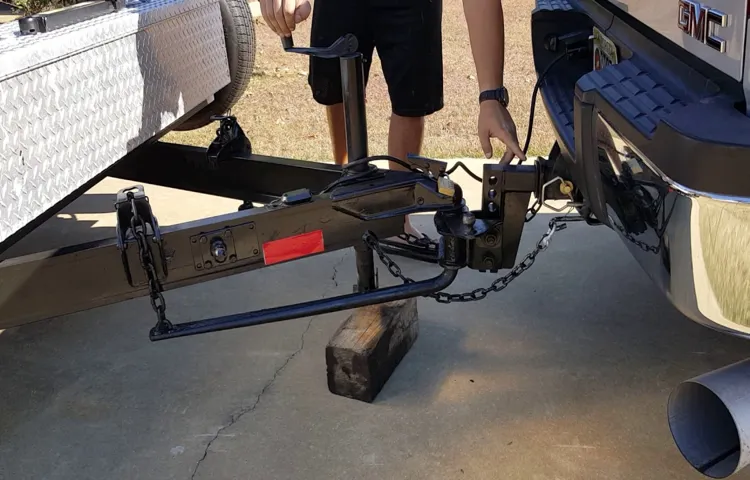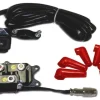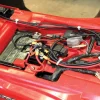If you’re new to towing trailers or have ever experienced the unsettling feeling of your trailer swaying back and forth while driving, then you might be wondering when you need an equalizer hitch. An equalizer hitch, also known as a weight distribution hitch, is a valuable tool that helps distribute the weight of your trailer more evenly between your towing vehicle and trailer. But when is it necessary to use one? Imagine you’re on a road trip, towing your travel trailer behind your truck.
As you hit a bump or encounter a strong gust of wind, your trailer starts to sway uncontrollably from side to side. This can create a treacherous situation, endangering both yourself and other drivers on the road. The unequal weight distribution between your towing vehicle and trailer is causing this instability.
An equalizer hitch works by leveling and distributing the weight of your trailer across all axles, improving stability and control while towing. It essentially acts as a bridge, connecting your towing vehicle to your trailer and ensuring that both are working in harmony. So, when do you need an equalizer hitch? The answer depends on several factors.
First, consider the weight of your trailer. Generally, if your trailer weighs more than 50% of your towing vehicle’s weight, it’s recommended to use an equalizer hitch. This will help prevent excessive strain on your towing vehicle’s suspension and improve overall towing performance.
Secondly, think about the length of your trailer. Longer trailers have a greater tendency to sway, especially when experiencing strong crosswinds or passing large vehicles. If your trailer is over 20 feet in length, using an equalizer hitch becomes even more important to ensure safe and stable towing.
Lastly, consider the type of terrain you’ll be towing your trailer on. If you frequently encounter steep inclines, uneven roads, or off-road conditions, an equalizer hitch becomes crucial. These challenging terrains can put additional stress on your towing vehicle and trailer, making the use of an equalizer hitch essential for maintaining control and stability.
Table of Contents
Why Use an Equalizer Hitch?
When do you need an equalizer hitch? If you’re towing a heavy trailer with your vehicle, an equalizer hitch can provide added stability and control. This type of hitch is designed to evenly distribute the weight of the trailer across all axles, reducing sway and helping to maintain a level ride. It’s particularly beneficial when towing large trailers, such as fifth-wheel trailers or travel trailers.
An equalizer hitch can also help to improve your vehicle’s handling and braking performance while towing. So, if you’re planning to haul a heavy load with your vehicle, investing in an equalizer hitch is definitely worth considering.
Uneven Weight Distribution
An equalizer hitch is an essential piece of equipment when it comes to towing a trailer. One of the main reasons to use an equalizer hitch is to help distribute the weight evenly between the towing vehicle and the trailer. Uneven weight distribution can cause many problems when towing, such as swaying, decreased stability, and increased strain on the towing vehicle.
But how does an equalizer hitch solve this issue? Well, it works by transferring some of the weight from the rear axle of the towing vehicle to the front axle, as well as to the axles of the trailer. This redistribution of weight helps to level out the ride and improve the overall towing experience. It’s like having a personal trainer for your towing setup, ensuring that everything is in balance and working together smoothly.
So, whether you’re towing a camper, a boat, or any other heavy load, an equalizer hitch is a must-have tool to ensure a safe and comfortable journey.

Towing a Heavy Load
equalizer hitch
How Does an Equalizer Hitch Work?
When do you need an equalizer hitch? Well, an equalizer hitch is a valuable tool for towing heavy loads with a trailer. It is specifically designed to distribute the weight evenly between the tow vehicle and the trailer, making it easier to control and preventing excessive strain on the vehicle. So, if you find yourself towing a trailer that is significantly heavier than your tow vehicle, or if you notice that your vehicle is struggling to maintain control while towing, it may be time to consider using an equalizer hitch.
Using one of these hitches can greatly improve the towing experience, ensuring safety and stability on the road.
Weight Distribution
equalizer hitch, weight distribution, tow vehicle, trailer, towing capacity When it comes to towing a trailer, weight distribution is crucial for maintaining stability and safety on the road. An equalizer hitch is a valuable tool that helps achieve this balance. But how exactly does it work? An equalizer hitch, also known as a weight distribution hitch, is designed to evenly distribute the weight between the tow vehicle and the trailer.
This is important because when a trailer is not properly balanced, it can cause the tow vehicle to become unstable, making it difficult to control and increasing the risk of accidents. So, how does an equalizer hitch achieve this balance? Well, it works by utilizing spring bars that are attached to both the trailer and the tow vehicle. These spring bars apply upward pressure on the trailer and downward pressure on the tow vehicle, effectively transferring weight from the rear of the tow vehicle to the front axle and the trailer axles.
By doing so, an equalizer hitch helps to level out the tow vehicle, preventing it from sagging in the back and improving steering and braking control. This not only enhances the overall stability of the towing setup but also helps to maximize the towing capacity of the tow vehicle. Overall, an equalizer hitch is an essential piece of equipment for anyone who tows a trailer.
It ensures that the weight is distributed evenly between the tow vehicle and the trailer, improving stability and safety on the road. So, if you’re planning on towing a heavy load, make sure to invest in an equalizer hitch to make your journey much smoother and safer.
Sway Control
equalizer hitch, sway control
Increased Stability
equalizer hitch work, stability, trailer, towing, weight distribution, sway control, friction, spring, tension, distributed, force, bounce, suspension, road, bumps, safety precautions, towing experience, driver, vehicles, maneuverability, turning, braking, speed, wind resistance, weight, trailer sway, unsatisfactory, stressful, accident, dangerous, hitches, vehicle, load, towing capacity, weight ratings “Increased Stability”
Choosing the Right Equalizer Hitch
When it comes to towing trailers or heavy loads, choosing the right equipment is essential to ensure safety and ease of towing. One such equipment that plays a crucial role is an equalizer hitch. But, when do you actually need an equalizer hitch? Well, the answer depends on various factors such as the weight of your trailer and the capacity of your towing vehicle.
An equalizer hitch is typically recommended when the weight of your trailer exceeds more than 50% of your towing vehicle’s weight. This is because an equalizer hitch distributes the weight evenly between your towing vehicle and the trailer, reducing the strain on your vehicle’s suspension and ensuring better control and stability while towing. So, if you’re planning to tow a heavy load or a weighty trailer, it is highly advisable to invest in an equalizer hitch to make your towing experience safer and more comfortable.
Weight Rating
weight rating, equalizer hitch
Type of Towing Vehicle
One important factor to consider when towing a trailer is choosing the right equalizer hitch for your towing vehicle. An equalizer hitch, also known as a weight distribution hitch, helps distribute the weight of the trailer evenly across the axles of the vehicle and trailer. This can greatly improve the stability and control of your towing setup, making it safer and easier to tow your trailer.
When choosing an equalizer hitch, you’ll need to consider the towing capacity of your vehicle, as well as the weight of your trailer. It’s important to choose a hitch that is capable of handling the combined weight of your vehicle and trailer, ensuring that you have the necessary control and stability while towing. Additionally, you’ll want to consider the type of trailer you’re towing and any specific requirements it may have, such as a sway control feature.
Overall, by choosing the right equalizer hitch for your towing vehicle, you can greatly enhance your towing experience and ensure the safety and stability of your trailer.
Type of Trailer
equalizer hitch
Conclusion
In conclusion, deciding when you need an equalizer hitch is like being the conductor of life’s symphony. Just as a conductor ensures that each instrument plays harmoniously and in balance, an equalizer hitch ensures that your vehicle and trailer work together seamlessly. When you find yourself asking, “Do I need an equalizer hitch?” think about your towing setup as a finely tuned orchestra.
If you’re towing a small trailer with a lightweight vehicle, you might not need the added support of an equalizer hitch. But if you’re planning on hauling a larger trailer or a heavier load, it’s time to bring in the harmony of an equalizer hitch. Think of an equalizer hitch as the maestro of your towing ensemble – it redistributes the weight and sway, making sure that all the elements are in sync.
No more jarring jerks or wobbly performances on the road! With an equalizer hitch, your towing experience will be so smooth, it’ll feel like you’re gliding through a melodic masterpiece. So, next time you’re pondering the need for an equalizer hitch, remember this: just as a conductor brings together a symphony, an equalizer hitch brings together your vehicle and trailer. It’s the key to towing bliss, offering stability, control, and a towing experience that hits all the right notes.
So, whether you’re cruising down the highway or maneuvering through tight turns, make sure to bring your towing setup into perfect harmony with an equalizer hitch. Because when it comes to towing, there’s no such thing as being too in tune!”
FAQs
What is an equalizer hitch and why do I need one?
An equalizer hitch is a type of hitch that helps distribute the weight evenly between the towing vehicle and the trailer. It is necessary when towing heavy loads or trailers to ensure stability and control.
When should I use an equalizer hitch?
You should use an equalizer hitch when towing trailers that exceed a certain weight limit, typically around 5,000 pounds. It helps improve the towing experience by reducing sway and improving control.
How does an equalizer hitch work?
An equalizer hitch works by using integrated spring bars that transfer some of the tongue weight of the trailer to the front axle of the tow vehicle. This distribution of weight helps level the trailer and tow vehicle, improving stability and control.
Can I tow without an equalizer hitch?
Towing without an equalizer hitch is possible for smaller trailers or lighter loads. However, for larger trailers or heavier loads, it is highly recommended to use an equalizer hitch to ensure safe and controlled towing.
Are all equalizer hitches the same?
No, there are different types and models of equalizer hitches available in the market. They vary in terms of weight capacity, features, and compatibility with different types of tow vehicles and trailers. It is important to choose the right one for your specific towing needs.
How do I choose the right equalizer hitch for my trailer and tow vehicle?
To choose the right equalizer hitch, consider the weight of your trailer, the weight capacity of your tow vehicle, and any specific towing requirements or preferences you have. It is recommended to consult with a professional or knowledgeable retailer to ensure you make the right choice.
Can I install an equalizer hitch myself?
The installation process of an equalizer hitch can vary depending on the model and type. Some are relatively easy to install with basic tools and instructions, while others may require professional installation or specific tools. It is important to read the manufacturer’s instructions and guidelines before attempting to install one yourself.



